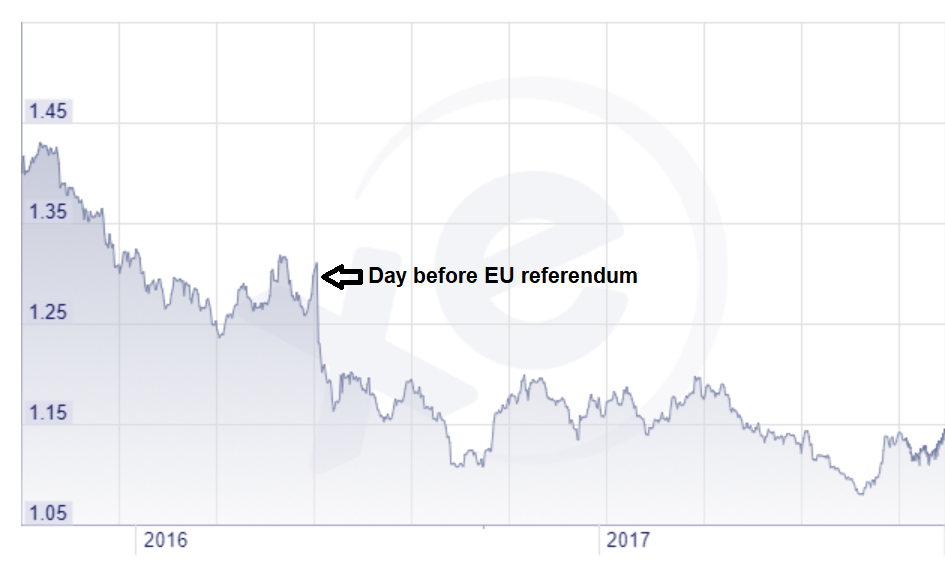British workers have been hit with a huge Brexit bill - before we've even left.

The cost of Brexit was never just about the financial loss. From cooperation on crucial issues like climate change and terror, to the freedom to live, love and work across the continent, the benefits of EU membership were laid out – and sadly disbelieved.
Nonetheless, in the month of the Autumn Budget, it’s about the economy, stupid. And a year and a half on from the referendum, we are seeing just how deep those financial tremors people warned about can run.
The first point is that the value of the pound collapsed after the Brexit vote – making the pound in your pocket literally worth less in terms of buying power:

But taken alongside the hit to the UK’s GDP and the relative decline in investment, we can get a clear idea of the overall financial impact so far.
A study released this week analyses data from the Office for National Statistics and other organisations, and shows that British households have lost £600 per head as a direct consequence of our vote to leave the EU.
The report, by the National Institute of Economic and Social Research (NIESR), shows a grim picture:
“The UK economy is estimated to have grown by 1.5 per cent in the year to the third quarter of 2017. This growth rate represents a material loss of momentum from annual rates of GDP growth of around 2 to 3 per cent achieved in the years leading up to the referendum. Productivity growth has also slackened off and output per hour appears to have been flat or falling.”
Report author Dr Garry Young is Director of Macroeconomic Modelling and Forecasting at the NIESR – and was until recently a Senior Adviser to the Bank of England. He writes:
“It is almost certain that the relative deterioration in the UK economy and the accompanying fall in living standards over the past year are a consequence of the vote by the British people to leave the European Union.
“Had sterling not depreciated and the economy continued to grow at its previous rate, as would have been likely with an improving global backdrop, real household disposable income per head might have been more than 2 per cent higher than now, worth over £600 per annum to the average household.
“…The effects of a higher cost of living caused by Brexit might weigh more heavily on unemployed, single parent and pensioner households.”
We have to hope that decline we are witnessing is just a factor of uncertainty. But with increasing talk of a high-tariffs, no-deal Brexit among senior Conservatives, the post-Brexit scenario is not looking too uplifting either.
How much more do British households have to lose before we realise this was all one bad move?
Josiah Mortimer is Editor of Left Foot Forward. Follow him on Twitter
Left Foot Forward doesn't have the backing of big business or billionaires. We rely on the kind and generous support of ordinary people like you.
You can support hard-hitting journalism that holds the right to account, provides a forum for debate among progressives, and covers the stories the rest of the media ignore. Donate today.




7 Responses to “British households have lost £600 a year because of Brexit”
greg
My household is doing quite well, thank you – with a couple of my nephews finally getting employment.
Please, don’t wish your nihilistic and elitist misery onto the ordinary households at my level of society; we now have more hope for the future than we’ve had for the last 40 years.
Jonathan Bagley
Many “experts”, including the IMF, thought the pound was previously overvalued. Over the forty years of my adult life, the pound has ether been too strong or too weak. I haven’t noticed a claimed 2% decrease in my disposable income. Mortgage costs, community charge, energy bills, car insurance, house insurance, gym subscription, costs of flights, satellite channels subscription, water rates, petrol, supermarket wine beer and wine prices all seem about the same. Butter has gone up 30p, but I only buy a pack a fortnight, and that’s due to a dairy shortage, not Brexit.
Owen Tudor
Jonathan, you may not have noticed a 2% decrease in your disposable income, but to take just one example from your list of prices, the petrol pump price has increased since June 2016 from 111p to 117p per litre – almost exactly 5% (and as duty has remained at 58p per litre, the actual petrol has increased in price by 10% over that time.) So the fact you haven’t noticed only tells us about your perception (not that that isn’t important – and if your income has risen by more than 5% in the last year, that increase won’t have reduced your living standards.) But….
Alma
The gap is not because of Brexit but more because of those players around. Moneymakers rulz!
patrick newman
We have a weird bunch posting today. They dont seem to live in the real world. They dont need headsets to live in a VR. It would seem that the only view they have is the Thatcher me, me, and me world. Never mind CPI it is RPI that ordinary folk need to think about and that is now 3.9% when pay is 2% And of the list compiled above most of Mr Bagley’s list have seen price increases since June 2016 – there is more to come! I hope Greg’s ‘nephews’ have found well paid jobs with good T&C’s because that is not the norm for people entering or re-entering the job market.